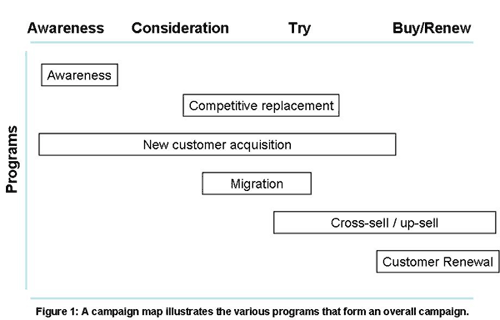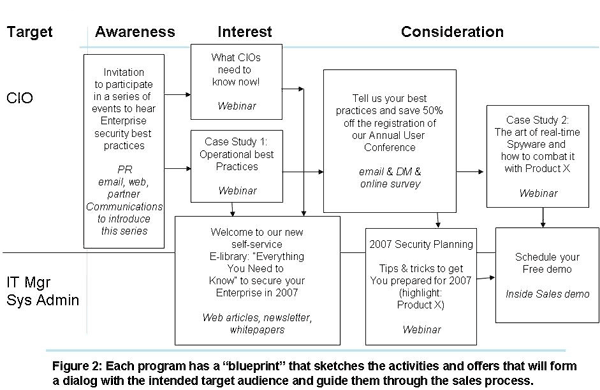
www.kickstartall.com
The Truth about Campaign Management
Recognizing a good integrated marketing campaign is easy, but working the process takes practice
by Mike Gospe
The single, basic truth about world-class campaign management is that it is easy to say, but hard to do. It is hard to do because to do it properly requires following a disciplined, systematic approach that becomes both a guide and a tool for helping a company make better marketing and sales investment decisions in order to optimize its performance. Done effectively and consistently, integrated campaign management will create a tighter company-prospect/customer bond and produce a differentiated level of loyalty so that when the prospect is ready to buy, your company is top on their list.
The term "integrated campaign management" is not new. And, most every marketing VP will say they are executing marketing campaigns. However, upon closer inspection, many marketing teams fall victim to at least one of the three following myths. This article introduces these myths and offers a perspective to help teams take better control over their investments and activities.
Myth #1: A busy marketing team is an effective marketing team.
In today's global marketplace there is no shortage of work that must be done. Everyone has (or should have) goals and objectives that drive their day-to-day work. However, many companies (both Fortune 500 as well as start-ups) find themselves executing a variety of marketing projects that aren't really part of an overall defined marketing plan. In other words, they are busy writing press releases, generating emails, coordinating webinars, but none of these activities are linked to each other. At the end of the day, they have produced "marketing popcorn" - discrete marketing projects that feel good when accomplished, but don't clearly nurture an ongoing dialog with a prospect or customer.
World-class marketing organizations avoid this trap by crafting a campaign strategy, with clear goals and metrics that guide a dialog over a set period of time. They market to their target audience as if they are playing a game of chess - thinking one, two, or even three steps ahead. Figure 1 shows an example of what a simple campaign strategy may look like when laid out on a "map."
Figure 1: Campaign Map

Notice that programs (e.g. awareness, migration, new customer acquisition) are mapped to a specific communications strategy. The collection of these programs form a campaign. For each program, a "blueprint" illustrates the specific activities and offers that will be used to engage the prospect in a meaningful dialog. This is illustrated in Figure 2.
Figure 2: New Customer Acquisition Program
Blueprint example

This takes time to plan, and discipline to follow. But, companies like Symantec, Informatica, and HP will tell you that the pay-off is far greater when an integrated campaign strategy has been defined before the marketing tactics are deployed.
Myth #2: Sales people are a challenge to deal with; it's too much trouble to coordinate with them.
When marketing teams act independently from sales, the results will always be less than optimal. There is an almost unlimited number of ways for marketing to be busy. The key question is what activities should marketing be executing (and when) that will help the sales team close more deals more quickly?
The marketing-sales alignment should be a topic of every day discussion, not just once a year. By that I mean that developing a joint sales and marketing strategy at the beginning of the year and then discussing feedback in real time and making course corrections should be a standard operating procedure for all companies. Some companies will leave this interaction to the discretion of the individual; however, world-class marketing organizations drive and encourage this process by setting up a series of marketing-sales touch points to review progress quarterly, if not monthly. In short, marketing and sales teams should be working with a "hand in glove" expectation and mentality. As an example, many companies hold quarterly marketing-sales Summits. These ½ day to full day meetings are typically led by the CMO, but include representatives from corporate and regional marketing and sales teams. These are interactive meetings designed to create tighter bonds between the teams while solving business issues in real time.
Myth #3: Realistically, we must be open to all revenue opportunities. "We can't say no."
Of the three myths, this one is probably the toughest for marketing teams to wrestle with because there can be some painful fallout by saying "no." In fact, it is a common frustration for marketing teams when they go through a planning process that focuses attention on a specific market only to find that the sales team has landed a big fish in a totally separate industry, requiring the marketing team to back-peddle to support the closing of this specific sale. Unfortunately, this is usually the rule rather than the exception. Regardless, the most effective marketing teams are those that have the courage to help the executive and sales teams drive focus and agree upon which target markets and which opportunities are the most important. Trying to be all things to all markets always leads to sub-standard results and confused customers and prospects.
Now, there is a common misconception about this myth and how to address it. When marketing drives focus, it is really saying where, when, and how its proactive marketing investment and activities should be executed. It is not saying that it won't accept a sale from some other non-target customer. In other words, a company may decide to execute a series of webinars, sales events, and direct mail to the financial and hospitality industry; but, if a small-medium-sized retail business wants to make a purchase, the company will happily sell them the product.
To help alleviate this frustration and provide a venue for productive discussion and decision-making, world-class companies like Aspect, HP, Sun have formed cross-functional executive steering committees to address business, marketing, and sales disagreements. The steering committee, when used properly, can be a very effective tool and guide for escalating important issues that have a direct impact on the vision and mission of the company.
Secrets from a Campaign Manager
Integrated marketing campaigns don't just happen. They are carefully planned by a cross-functional team and their execution requires leadership and skills from a variety of players - both internal employees and their supporting contractors. I worked as a campaign manager and then a director of campaign management for eight years at HP, Sun, and Ariba. Here are just a few of the lessons I learned:
- Campaign management is a marathon, not a sprint. Good campaigns take time to build and nurture a dialog with a prospect/customer because prospects are not always ready to buy when the company is ready to sell. Development and approval of a well-thought-out campaign can easily take 10 - 12 weeks, depending on its complexity.
- Integrated campaigns are built by cross-functional teams. A good campaign manager drives the process, but does not dictate the plan. Instead, the best campaign managers bring in experts from the regions and the marketing functions and facilitate a process whereby the best, most effective plan will emerge.
- Set the strategy before beginning to execute. As I mentioned earlier, avoid the temptation to produce "marketing popcorn." Like in playing chess, take the time to consider each next move before executing it.
- Track results and make real-time course corrections. Effective campaign managers set up mechanisms for tracking progress and communicating results often.
- Use an outside, experienced facilitator to help develop and fine tune the campaign management process. An outside, unbiased resource can be an asset in launching a cross-functional team for the first time in an organization where the relationships may be strained or difficult.
Other KickStart Alliance related articles:
- TOGETHER
- Sales and Marketing
- Launching
Solutions with Impact, Part #2: Ready, Aim, Fire!
- The Launch Boss: What it is, and why you may need one
About the Author
Mike Gospe has helped companies like HP, Sun, Ariba, Informatica,
Symantec, and a number of startups architect and execute winning marketing
campaign processes. For
more information on these and other tips and tricks, please contact Mike at 650.947.8974.
Copyright 2007 KickStart Alliance www.kickstartall.com